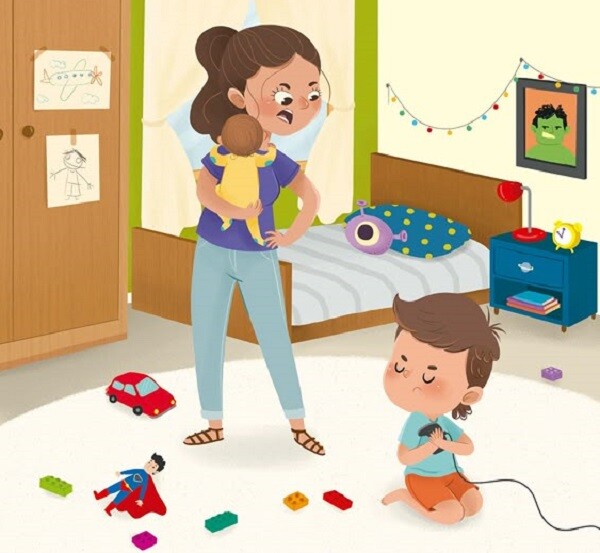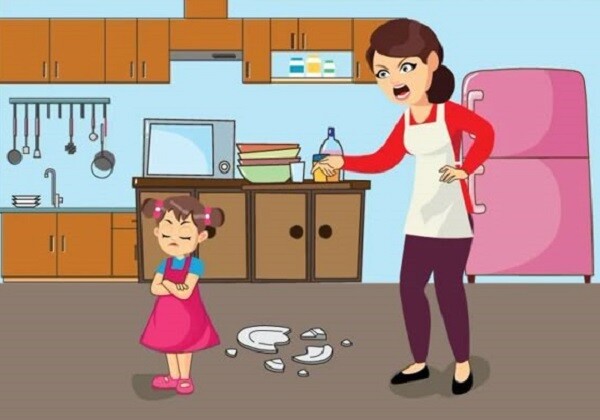Children often get distracted and find it challenging to settle down to complete a task, which can be frustrating for parents.
Professor of Psychology Li Meijin has pointed out that children’s lack of focus, leading to poor academic performance, is often closely related to parental behavior. She has identified four behaviors in parents’ daily lives that can hinder children’s ability to focus on their studies.

Interrupting their activities
Many parents unknowingly interrupt their children when they are focused on a particular activity. For example, when a child is engrossed in building blocks or drawing, parents may suddenly ask them to stop and eat or switch to another task.
This interruption disrupts the flow of the child’s thoughts, causing frustration and annoyance. Children need time to shape their ideas and emotions during creative processes, and constant interruptions can make them feel disrespected.

Interrupting their activities.
When interrupted, a child’s brain has to switch from a focused state to another, which requires a significant effort and can be stressful. If children consistently face such disruptions, their concentration abilities are not adequately honed, leading to difficulties in task completion.
Moreover, these interruptions can cause children to feel discouraged and lose interest in activities they once enjoyed. When children no longer feel enthusiastic about their block-building or drawing due to constant interruptions, they gradually avoid these activities.

Frequent supervision without patience
Some parents tend to lose patience and frequently urge or blame their children when they struggle to focus. This is especially true when parents become impatient, creating psychological pressure for the child.
Constant reprimanding and comparisons can make children feel burdened and stressed, believing they are failing to meet expectations. This creates a vicious cycle where the child feels not only dissatisfaction but also a sense of helplessness. As a result, their concentration diminishes, and they become more easily distracted.

Frequent supervision without patience.
Over time, this anxiety can become severe. Children who once had a passion for learning or creative endeavors may start to feel discouraged and eventually give up altogether. Moreover, the feeling of not being able to meet expectations can lead to more serious issues in the future, such as low self-esteem and depression or anxiety.

Engaging in other activities while with your child
Children are excellent imitators and often learn by observing their parents’ behavior. If parents are constantly distracted by other activities while with their child, such as watching TV, playing with their phones, or chatting during playtime, the child is likely to emulate this behavior.
When children perceive that their parents are not paying attention to them, they may feel unimportant, leading to feelings of loneliness and a lack of connection. The quality of the parent-child relationship diminishes, and the child may begin to feel that interacting with others is unnecessary since they are not receiving the required attention and care.
This can affect their ability to develop social skills and make it challenging to connect with peers and others in the future. Moreover, when children do not understand the importance of focusing on a task, they will struggle to form the necessary habit of concentration for their studies, falling behind their peers and lacking essential skills for the future.

Not allowing children to complete tasks independently
Some parents, worried about their children’s academic performance, tend to do everything for them, whether it’s cleaning their room or finishing their homework.
While this may temporarily ensure smooth progress and provide reassurance about their child’s academic outcomes, it actually deprives them of the opportunity to develop self-management and concentration skills. Children need to learn from their mistakes and face challenges to build resilience and a problem-solving mindset.

Not allowing children to complete tasks independently.
Overprotection prevents children from learning to face challenges independently, leading to a sense of dependence and reduced self-confidence. It also hinders the development of independence, a crucial aspect of their future adulthood.
Moreover, when children are not given responsibilities, they lack time management and organizational skills. If they do not learn to manage their tasks effectively, they will struggle to complete tasks efficiently as they grow older, especially in demanding academic and work environments.
The Magic Formula: 4 Steps to Help Parents and Children Excel
It is widely acknowledged that a child’s upbringing is heavily influenced by their parents’ emotional state and overall mindset. Experts in the field of child development strongly advocate for parents to prioritize their own emotional well-being and cultivate a positive outlook, as a foundational step towards effective parenting.







































